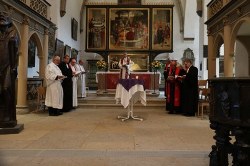
In a closing sermon, Bishop Prof. Dr Heinrich Bedford-Strohm, chairperson of the Council of the Evangelical Church in Germany, reflected that there is much we long for when we envisage the future of the church.
"We yearn for a church that will give strength to all those who are weary, who labour and are heavy laden, who want to find rest again in a world which is spinning ever faster," he said. "A church, in which we can perceive something of the joy and lust for life that comes with an awareness of the gifts God grants us every day, and for which we give him thanks and praise."
Coming to the table together
Conference participants attended a closing service on 27 August entitled "Celebrating Together at the Lord's Table." They celebrated the Eucharist according to the Lima Liturgy, led by World Council of Churches (WCC) general secretary Rev. Dr Olav Fykse Tveit.
The Lima Liturgy was drawn up by the late French theologian Max Thurian in preparation for the plenary session of the WCC Faith and Order Commission held in Lima in 1982. Over the years, the Lima Liturgy has drawn ecumenical attention to the belief that the final locus for doctrinal convergence is table of the word and the table of the bread and wine.
"This celebration and sharing of the Eucharist by so many church families would not be possible when the WCC was founded. Almost 70 years after we continue to harvest the fruits of the ecumenical dialogues and the commitment to unity," said Tveit. "This is a reality even when we are honest about what is still dividing among the church families. We need to nurture the vision of more visible unity. For me as a Lutheran pastor it was particularly meaningful to be doing so in the church in Wittenberg - in front of the altar with the painting of the preaching of Jesus Christ as the centre of our faith and our unity."
This particular Lima Liturgy also commemorated 500 years since the start of the Reformation and 50 years since the creation of the IEF. The service was held at Stadtkirche St. Marien zu Wittenberg, and the central liturgical texts were spoken together by Roman Catholic, Orthodox, Anglican and Protestant worship leaders. Concelebrants were, in addition to Bedford-Strohm and Tveit, Rev. Martin Engels, moderator, Reformed Alliance; Rev. Dr Margriet Gosker, Protestant Church in the Netherlands; Bishop David Hamid, Diocese in Europa of the Anglican Communion; Bishop Jurgen Johannesdotter, Evangelical Lutheran Church of Schaumburg-Lippe; Bishop Dr Matthias Ring, Catholic Diocese of the Old Catholics in Germany; Bishop Volker Schulz, Moravian Church (Herrnhuter Brudergemeine); and Bishop Rosemarie Wenner, Evangelical Methodist Church. Celebrants were Rev. Dr Johannes Block, pastor at St Marien Church; and Bishop Dr Anba Damian, Coptic Orthodox Church.
A witness for unity
Bedford-Strohm shared a vision of a church that gives a sense of direction in a world where over-simplification, intolerance, nationalism and programmatic egoism find approval: "A church which never ceases to protest against the moral scandal of 24,000 people dying every day because they do not have enough to eat or lack the medicines that they need, although there is sufficient supply of all of these available in the world," he described. "We yearn for a church which in such a world testifies in both word and deed to the love of God, a church which is itself a manifestation of what it talks about."
Such a church can never remain as a church in which those who address each other as sisters and brothers still remain separated at the Lord's table, said Bedford-Strohm. "Such a church must at the same time be a witness for unity."
There is a hunger for love, he continued: "For being able to accept oneself. For being able to accept others and to live in relationship with them. For not having the person whom I love say about me: money-back guarantee if not satisfied," he said. "Jesus is the bread of life, because his love is a radical love, which does not stop at any of the borders that we erect, a love that even includes our enemies."
Bedford-Strohm also spoke of a hunger for forgiveness, for mercy, for community, for hope - and of Jesus as the bread of life. "He satisfies our hunger for love, our hunger for forgiveness, our hunger for mercy, our hunger for community, our hunger for hope," he said. "And he gives us himself today, when we break bread with one another and share the wine with one another."
As those gathered celebrated the Lord's Supper in the framework of the Lima Liturgy, Bedford-Strohm acknowledged that not everyone saw themselves in the position of being able to take part. "But we can still send out a symbolic message," he noted. "As the representatives of many Christian churches we can still celebrate this service together."
The theme of the IEF conference, held 21-28 August, was "From the True Treasure of the Churches – Discovering the Gospel Together."
The assembly released a "Declaration of Wittenberg: We walk towards the visible unity of the Church," a statement that challenges people to transform a painful history of conflict and indifference into a journey of reconciliation and unity.
"An extraordinary chance" for hope, Tveit reflects in Wittenberg (WCC press release 25 August, 2017)
Wittenberger Ökumenische Versammlung 2017
Pilgrimage of Justice and Peace
The World Council of Churches promotes Christian unity in faith, witness and service for a just and peaceful world. An ecumenical fellowship of churches founded in 1948, today the WCC brings together 348 Protestant, Orthodox, Anglican and other churches representing more than 550 million Christians in over 120 countries, and works cooperatively with the Roman Catholic Church. The WCC general secretary is the Rev. Dr Olav Fykse Tveit, from the [Lutheran] Church of Norway.




 Sign Up to Receive Press Releases:
Sign Up to Receive Press Releases: